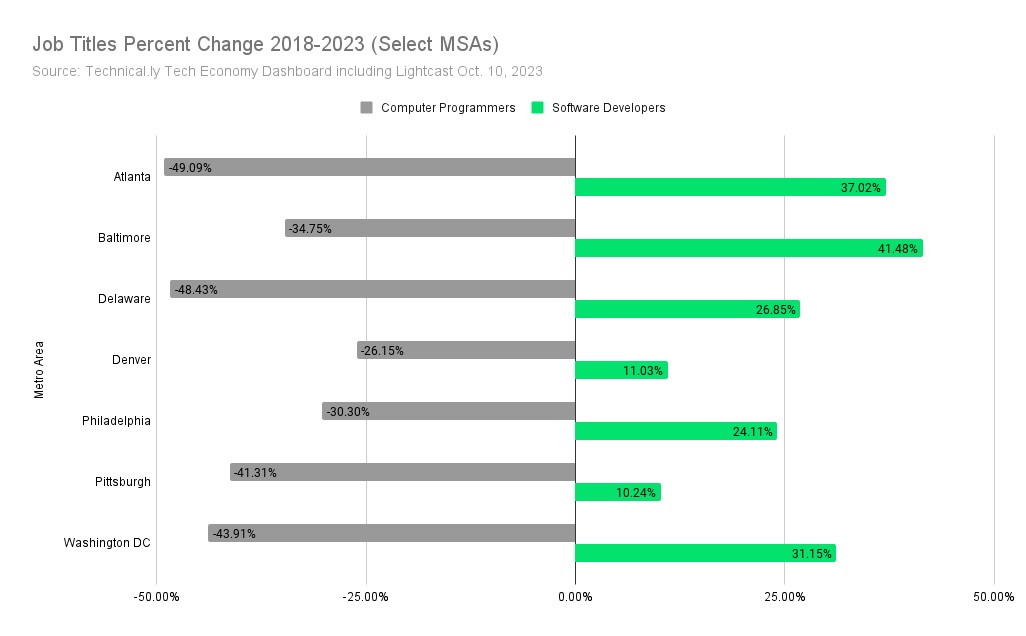Ada Lovelace was the world’s first computer programmer. Too bad nobody has that title anymore.
Born in 1815, Lovelace was a 19th-century English mathematician credited with first interpreting how to generate numbers using computer pioneer Charles Babbage’s proposed mechanical “analytical engine.” She was programming an early computer, a function that gave rise to “computer programmer” as one of the late 20th century’s most widespread tech job titles.
As internet applications advanced, “web developer” proliferated, too, describing those creating and editing websites and other online tools. In the last 20 years, “software developer” has become the dominant title, reflecting the most common needs in an era of digital transformation — writing and maintaining software code. Today, in most US cities, “software developer” is the most common tech job title, and still one of its fastest-growing. Nearly 30,000 people in the Philadelphia region have the title, but barely 3,000 are “computer programmers” — a proportion that is consistent in Baltimore and Pittsburgh.
What’s the difference between “computer programmer,” “web developer” and “software developer?”
For a time, it wasn’t entirely clear which job title would become the most prevalent between “computer programmer,” “web developer” and “software developer.” They’ve all represented the front lines of the digital age, yet as their numbers swelled, these titles have somehow managed to be both too generic — and too specific.
For non-technical business leaders, other informal terms developed. “Coder” became a catchall for anyone manipulating code — websites, software and anything in between — and some still favor its workmanlike connotation. The term “hacker” got its technical meaning in the 1980s as a kind of cyberterrorist boogeyman, but it has evolved to both refer to the tactical act of breaking into computer systems and be reclaimed by so-called civic hackers who build small technical interventions.
Some of those most unfamiliar with software have used the term “techie,” which we at Technical.ly resoundingly reject as othering. I still prefer “technologist” as a generic term for anyone in a technical profession — from software to robotics, from data science to information security.
Language evolves, and that includes tech job titles. They may reference what programming languages are used and whether someone is focused on the “frontend” (graphical interfaces) or “backend” (system infrastructure). For much of software’s history, you could be as likely to be a “backend programmer” as “backend developer.” That’s increasingly no longer the case.
The “computer programmer” title may go extinct

(Technical.ly Tech Economy Dashboard screenshot/Courtesy Technical.ly)
Despite being the oldest, “computer programmer” appears to be in a steep decline, according to a Technical.ly analysis, while “software developer” is extending its lead as this era’s defining job title.
Since 2018, per a Technical.ly analysis of Lightcast data, the number of people with the title “software developer” in the Baltimore region ballooned by 41%. It’s grown by 25% in Atlanta, DC Metro, Philadelphia and Delaware, and growing by 10% in Denver and Pittsburgh. Over the same period, the number of those with the title Computer Programmer has shrunk by more than 30% or more across those same markets.
In 2021, one single solitary person appears to have graduated from Baltimore area schools with a “computer programming” degree; more than 100 earned that degree in 2018. Now, general computer science, mathematics and statistics are common paths. Five years ago, a similar number of graduates from Philadelphia regional colleges had degrees in “computer programming” as “computer science.” Today, the former has 20 times fewer than the latter.
The same decline isn’t happening with other titles. For example, though far fewer have the “web developer” one, its status has remained far more stable over the last five years. In Philadelphia, the $115,561 median annual earning of a software developer is more than $25,000 higher than that for computer programmers; that divide is similar across metros Technical.ly assessed. The median earnings for a “web developer” are less than $80,000.
This mirrors the experience of technologists contacted for this story. Timothy Allen was once a “senior programmer” and Colin Dean got his start as a “developer,” but both of their titles today include the term “engineer,” which has the most prestige of any technical role.
Terms will continue to evolve. None of this is static, just like the rest of language — and the technology we work on. Tellingly, the word for what Ada Lovelace was doing 150 years ago is still familiar to us today, even if the terms she would have used to describe her work won’t be.

This piece first appeared in Technical.ly CEO Chris Wink’s Builders newsletter. It features tips on growing powerful teams and dynamic workplaces. Sign up to get more pieces like this in your inbox before they appear on our site.
Before you go...
Please consider supporting Technical.ly to keep our independent journalism strong. Unlike most business-focused media outlets, we don’t have a paywall. Instead, we count on your personal and organizational support.
Join our growing Slack community
Join 5,000 tech professionals and entrepreneurs in our community Slack today!

Millions of dollars pour into semiconductor manufacturing in Southwestern PA

Look inside: Franklin Institute’s Giant Heart reopens with new immersive exhibits



